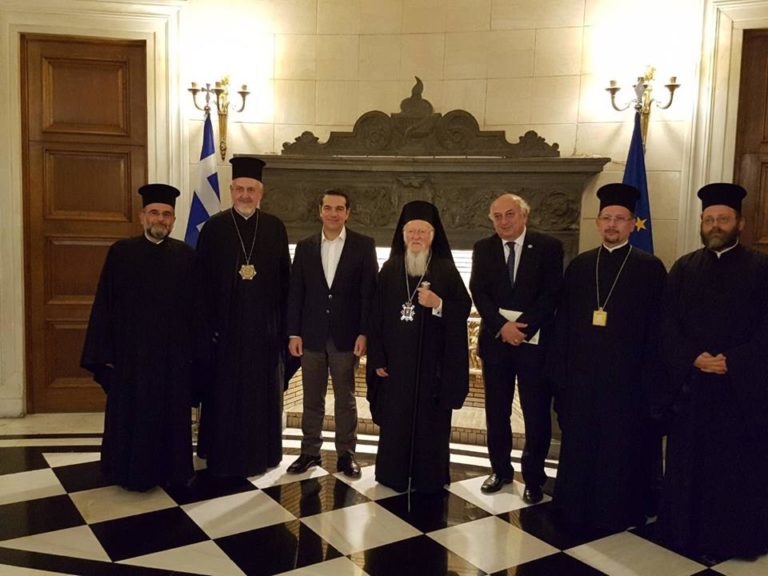
The Ecumenical Patriarch Bartholomew visited Athens from 30 October to 1 November 2017 to participate in the Second International Conference on “Religious and Cultural Pluralism and Peaceful Coexistence in the Middle East”, organized by the Ministry of Foreign Affairs of the Hellenic Republic at a time when the situation in the Middle East remains volatile. Present were the President of the Hellenic Republic, Mr Prokopios Pavlopoulos, and the Prime Minister, Mr. Alexis Tsipras, as well as the Patriarchs Theodoros II of Alexandria and Theophilos III of Jerusalem, the Archbishop Ieronymos II of Athens, the Archbishop Anastasios of Tirana, Metropolitan Hilarion of Volokolamsk representing the Moscow Patriarchate, a high-ranking delegation from the Vatican, and prominent religious leaders from the Muslim and Jewish worlds.
The first International Conference took place in October 2015 on the initiative of Minister of Foreign Affairs, Nikos Kotzias. With the need for tolerance and peaceful coexistence remaining of immediate pressing concern – as violence, intolerance, religious fanaticism and radicalization continue to afflict a large portion of the Middle East – the second International Conference, two years later, aspires to move ahead to the strengthening of a dialogue framework that promotes rapprochement, networking, mutual respect and peaceful coexistence among the different religious and cultural communities of the region.
The event was supported by the Centre for Religious Pluralism in the Middle East (CRPME), founded following the first Conference and functioning as an institution that monitors developments, reports on problems related to issues of religious and cultural pluralism, and presents specific proposals to deal with these problems.
In his address, the Ecumenical Patriarch Bartholomew promoted the interfaith and intercultural dialogue, stressing that it constitutes “a constructive contribution to the promotion of dialogue in interreligious and intercultural challenges, whose resolution is a prerequisite for the reestablishment of peaceful coexistence in the Middle East, as well in other regions of our unsettled modern world”.
The Ecumenical Patriarch stressed that “Interreligious dialogue is obligated and able to acquire value, purpose and effectiveness only if we are able to rid people of faith from the fear that pan-religious syncretism is allegedly pursued through such dialogue.” He also emphasized that “we must simultaneously point out in convincing fashion the value and necessity of mutual respect, forgiveness, love and solidarity for social cohesion, peace, restoration of justice, discouragement of fundamentalist fanaticism and acceptance of “others” in a rapidly globalized society, where the cohabitation of diverse nationalities, religions, and persuasions is henceforth unavoidable.”
He also underlined the necessity of widening, upgrading and of drawing up on different levels the ongoing inter-religious dialogue, and reiterated, as he did two years ago at the first Conference of Athens (2015 ), the proposal to establish a stable communication channel for a truly effective contribution to the prevention and combating of violent acts on the basis of religious beliefs. “We must establish a stable channel of communication for a truly effective contribution toward preventing and addressing acts of violence that supposedly occur out of religious conviction and mandate. Such an institution would also be able to develop a constructive cooperation with the Centre for Religious Pluralism in the Middle East and other organizations” said the Ecumenical Patriarch.